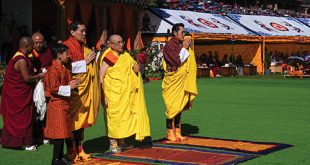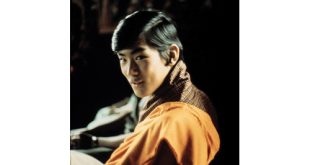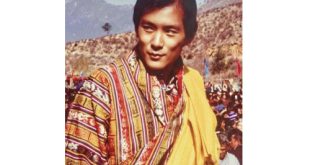By Suhasini Haidar
By the time His Majesty the Fourth King of Bhutan Jigme Singye Wangchuck ascended to the throne in 1972, the roots of the India-Bhutan relationship had already been planted firmly. The relationship in the early years since India’s Independence, built primarily between the Third King (1952-1972) and Prime Minister Jawaharlal Nehru (1947-1964) rested on three anchors that continue to give the relationship its weight- The first is the bond shared by the leadership in Delhi and Thimphu, across the decades. The second is India’s assistance in Bhutan’s development: harnessing Bhutan’s richest renewable resource of hydropower and the maintenance of roads in Bhutan by India’s Border Roads Organisations (BRO), as well as the provision of education, skilling and opportunities to Bhutanese youth. The third is Bhutan’s turn to India rather than its other big neighbour China, on matters of diplomacy, development and democracy, where they share many of the same values.
All three Kings of Bhutan (Third, Fourth and The Present King His Majesty Jigme Khesar Namgyel Wangchuck) have been Chief Guests at India’s Republic Day Parade, all Bhutanese Prime Ministers visit Delhi as honoured guests and all Indian leaders including Current Prime Minister Narendra Modi visit Bhutan amongst their first forays abroad after coming to office.
Planned development in Bhutan began with the First Five Year Plan (FYP) of Bhutan in 1961, and India has always provided assistance for the plans. Ties have been cemented by infrastructure development in Bhutan. The Indian Border Roads Organisation has built 1,600 kilometres of roads, 120 kilometres of tracks, 5,000 metres of bridges, helipads, Paro airport and the country’s telecommunications network along them as ‘Project Dantak’, that also began in 1961.
Meanwhile, the India-Bhutan collaboration on hydropower, called the “centrepiece” of bilateral relations by Prime Minister Dasho Tshering Tobgay has powered better ties since 1961 with the signing of the Jaldhaka project to provide electricity to southern Bhutan, and then with the 1964 336 MW Chukha Hydropower project, the first such initiative by India in Bhutan. Prime Minister Modi’s upcoming visit to Bhutan during the birthday celebrations of His Majesty The Fourth King will see the formal inauguration of the 1,020 MW Punatsangchhu-II Hydroelectric Project (PHEP-II), the latest in a long line of mutually beneficial ventures.
At all times, the relationship has worked only as it is seen in the mutual interest of both countries, not one or the other.
As a result, the ties have not been restricted to the leadership alone, and all former Managing Directors of Hydropower projects, many of whom have been given high national honours by their Majesties, have been specially invited to the celebrations, as have been all past Indian Ambassadors to Bhutan.
For more than half a century, it has been the constant presence of The Fourth King that Indian diplomats tasked with the relationship have always counted on, and consultations continue even after he abdicated the throne, as the Fifth King now leads the India-Bhutan relationship along with the Royal Government.
“His Majesty The Fourth King is the architect of the India-Bhutan relationship today,” says former Ambassador to Bhutan (1995 -1998) Dalip Mehta who was first posted to Thimphu from 1975-1978. “This is because from the very beginning he had the foresight to see that no matter what difficulties there were, and there were several, that it was necessary to overcome them. And he was a leader with the wisdom and patience to work through them,” Mr. Mehta adds, calling the ties between the two countries The Fourth King’s “legacy to the people of both countries”
Looking over this period, it is clear to see how the difficulties in the India-Bhutan relationship were most-often managed behind the scenes, but many of the differences between the two countries that remained amicable at all times, were visible.
In the 1970s, shortly after The Fourth King took the reins of the Kingdom, Bhutan’s appearance on the international scene met with some misgivings from India, that had, until then thought of itself as a ‘paternalistic guardian’ of Bhutanese diplomacy. Bhutan won its seat at the United Nations in 1971, and joined the Non-Aligned Movement in 1973, and hasn’t looked back on its autonomy in foreign policy since, while keeping Indian interlocutors closely informed on its plans.
Inevitably, the next challenge to the relationship came as China began to take a deeper interest in diplomatic ties and talks with Bhutan, sometimes accompanied by intrusions in grazing lands on Bhutan’s Western frontier.
During a visit to Mumbai in September 1979, the Fourth King explained why he was launching talks with Beijing. “Recent intrusions by Tibetan graziers deep into Bhutanese territory have underlined the need for direct talks between Thimphu and Beijing with the explicit purpose of demarcating and delineating the boundary between the two countries”, King Wangchuck said.
When the Bhutanese National Assembly gave His Majesty assent for the talks, it was after India had promised to cooperate in providing any documentary evidence Bhutan required for its claims, and before formal talks began Bhutan’s Foreign Minister, Lyonpo Dawa Tsering was dispatched to inform New Delhi.
Meanwhile Bhutan’s respect for Indian territory and security concerns were also seen during “Operation All Clear” in 2003 when The Fourth King himself led his troops into battle to defeat the United Liberation Front of Assam and Bodo rebels who had infiltrated into Bhutan’s south.
The early model for close consultations, both with Ambassadors in Thimphu and with leaders in Delhi on these sensitive talks has held ties steady even as more intense negotiations over the “Three-Step Roadmap” being agreed to in 2021 have continued between Bhutan and China.
“What stays with me from my years [as Ambassador] is the memory of the Fourth King of great intelligence and insight — spiritual, patriotic, a man of rare candour, yet so effortlessly down to earth,” said former Ambassador Ruchira Khamboj, who served in Thimphu from 2019-2022, and will join the birthday celebrations next week. “His presence will always be remembered with affection and respect,” she said, recounting the numerous occasions she was able to call on the Fourth King, even as these negotiations were underway.
Foreign Secretary Shyam Saran, who often discussed the progress in border talks with His Majesty said The Fourth King never lost sight of the larger issues. “I have had interactions with many world leaders during my diplomatic career. The 4th King of Bhutan was one of the most shrewd leaders that I have had to deal with,” he said. Perhaps, the most dramatic conversations would have been in 2005-2006, when His Majesty took several momentous decisions: to abdicate the throne to His Majesty the Fifth King, to give Bhutan its new Constitution that paved the way for an electoral democracy, and to revise the India-Bhutan Friendship treaty. In any other relationship, with any other leadership, all these changes may have brought a strain.
Other difficult areas would have been over Bhutan’s concerns on climate change, voiced by His Majesty, as this writer remembers, even in the 1990s, when few around the world would have raised such issues, may have run into problems with India’s drive for development, and later plans for a free Motor Vehicle Agreement (MVA). In addition, His Majesty’s considered support for the South Asian Association for Regional Cooperation (SAARC), an organisation that has declined due to India-Pakistan tensions may have been another- it has however been channelled into His Majesty The King’s plans to make the Gelephu Mindfulness City (GMC) as a “hub for South Asia”. Keeping the balance in ties during other geopolitical shifts would also have been a challenge.
“I first met The Fourth King of Bhutan in Thimphu in June 1989,” remembers Nirupama Rao who served as India’s Ambassador in Beijing, and then as Foreign Secretary. “Beijing was restless with student protests in Tiananmen Square, and the sense that the world order was shifting with Glasnost and Perestroika in the erstwhile Soviet Union was impossible to miss. Even Bhutan, cradled in the Himalayas, felt those tremors.”
“When he spoke about China and Bhutan’s relations , his words were thoughtful, far-seeing and measured. He already understood the fragile balance that small nations must hold when history begins to move faster. His friendship with India was warm and genuine, rooted not in formality but in a shared sense of trust,” Ms. Rao said, appreciating that The Fourth King would walk across Bhutan by foot, gauging the people’s opinions on issues before making his decisions, a practice His Majesty The King continues.
At the same time, it is the softer memories of the Fourth King that endure in his special engagement with Indian diplomats. In 1981, the then Indian Ambassador to Bhutan Salman Haidar’s wife and acclaimed theatre actress Kusum Haidar had organised a performance that Thimphu residents still speak about.
The performance, in English, of the Japanese play that Kurosawa had made into a film “Rashomon Gate”, was directed by Mrs. Haidar (this author’s mother-in-law), with roles acted by many senior members of His Majesty’s government, and the main played by Dasho Benji Dorji. The Fourth King heard about the performance, and in an unusual gesture, without concerning himself with protocol asked to see it.
Ambassador Sonam Rabgye, who was a Press Attache to India at the time re-produced the plays about 2 years ago, and was posted to Delhi from 1990-1997 said of the event that “bilateral relations between India Bhutan has many dimensions but it was the first time that it involved theater!” He recalled that Her Majesty Royal Grand Mother and Mrs. Haidar worked closely on this project as well.
Eventually a special performance of the play was held in honour of His Majesty’s 26th Birthday, which His Majesty himself attended- bringing together in that simple moment, as onlookers remember, his desire to build a special and personal relationship between the two countries, that went beyond the official and formal.
The writer is the Diplomatic Affairs Editor of The Hindu Newspaper

 The Bhutanese Leading the way.
The Bhutanese Leading the way.




